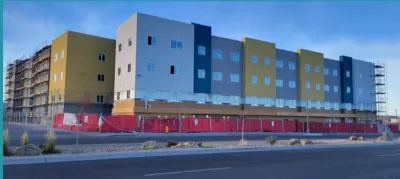Western states that hold millions of acres in land trusts are working to turn some of them into affordable housing.

As the affordable housing crisis grows, states in the Western U.S. are looking to underutilized state-owned lands as potential sites for new housing development, reports Alex Brown in Stateline.
Many of the properties in question were granted to states as “working lands” designed to fund public schools and community services by “leasing them for activities such as logging, mining, grazing and oil and gas development,” and, more recently, renewable energy farms, campgrounds, and other uses.
The process has its own unique challenges. “State land agencies often lack the expertise to develop land themselves, and requirements that they sell parcels for market rates often mean affordable projects are priced out. Officials are still figuring out which mechanisms — leases, land exchanges with local governments, auctions to developers — might work best for getting housing built.” While much of this land isn’t suitable for housing, and some protects critical habitats or other sensitive environments, state leaders see it as an opportunity to diversify their revenue streams and build much-needed housing by making it easier to build on sites near current development.
In Colorado, a new Public-Private Partnership Collaboration Unit formed by the state will support building housing on state-owned land through financing and technical assistance. “Utah has begun looking at ways to promote affordable housing on trust lands, including working with local governments to enact zoning changes that allow increased density.” In New Mexico, an affordable senior housing facility built on trust land opened last year.
FULL STORY: Western states look to these lands for new affordable housing

Planetizen Federal Action Tracker
A weekly monitor of how Trump’s orders and actions are impacting planners and planning in America.

Congressman Proposes Bill to Rename DC Metro “Trump Train”
The Make Autorail Great Again Act would withhold federal funding to the system until the Washington Metropolitan Area Transit Authority (WMATA), rebrands as the Washington Metropolitan Authority for Greater Access (WMAGA).

DARTSpace Platform Streamlines Dallas TOD Application Process
The Dallas transit agency hopes a shorter permitting timeline will boost transit-oriented development around rail stations.

Renters Now Outnumber Homeowners in Over 200 US Suburbs
High housing costs in city centers and the new-found flexibility offered by remote work are pushing more renters to suburban areas.

The Tiny, Adorable $7,000 Car Turning Japan Onto EVs
The single seat Mibot charges from a regular plug as quickly as an iPad, and is about half the price of an average EV.

Supreme Court Ruling in Pipeline Case Guts Federal Environmental Law
The decision limits the scope of a federal law that mandates extensive environmental impact reviews of energy, infrastructure, and transportation projects.
Urban Design for Planners 1: Software Tools
This six-course series explores essential urban design concepts using open source software and equips planners with the tools they need to participate fully in the urban design process.
Planning for Universal Design
Learn the tools for implementing Universal Design in planning regulations.
Municipality of Princeton
Roanoke Valley-Alleghany Regional Commission
City of Mt Shasta
City of Camden Redevelopment Agency
City of Astoria
Transportation Research & Education Center (TREC) at Portland State University
US High Speed Rail Association
City of Camden Redevelopment Agency
Municipality of Princeton (NJ)





























